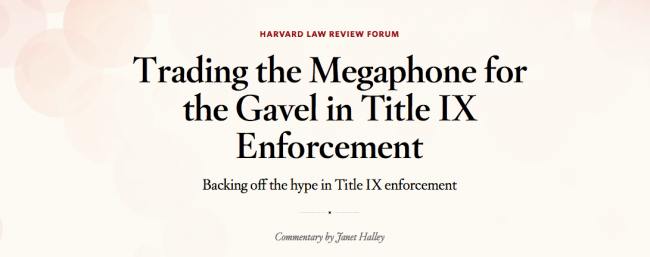Campus censorship and feminism: Oregon students banned from college for resembling classmate’s rapist

Katherine Timpf reports a story that is so ludicrous we thought Chris Morris had written it. The headline suggests that what follows is the work of a parodist:
Harvard Law Prof: Student Banned from Areas of Campus for Resembling Classmate’s Rapist
Harvard Law professor Janet Halley writes in the Harvard Law Review that she “recently assisted” a student who had been “ordered to stay away from a fellow student (cutting him off from his housing, his campus job, and educational opportunity) — all because he reminded her of the man who had raped her months before and thousands of miles away.”
The innocent man was then subjected to a “month-long investigation into all his campus relationships, seeking information about his possible sexual misconduct in them”. It was, says Halley, an “immense invasion of his and his friends’ privacy.”
Having proved his innonce, the man was bound. Halley adds:
“The stay-away order remained in place, and was so broadly drawn up that he was at constant risk of violating it and coming under discipline for that.”
The problem with the source is that Halley does not name the school, the students involved, or the outcome of the situation.
The reader is left hanging.
The other problem is that it sounds like it could well be true.
Halley begins her article:
When feminist advocates on campus sexual assault “speak truth to power,” they speak for (and often as) victims and survivors. In that position, it’s perfectly fair for them to pick and choose the constituencies to which they give voice. They can and should specialize. But as feminists issue a series of commands from within the federal government about what the problem of campus sexual violence is and how it must be handled, and as they build new institutions that give life to those commands, they become part of governmental power. Now that they have the power to adjudicate cases and determine sanctions, they are facing the full range of cases. For those feminists — and I would argue they should include, by now, the advocacy branch — the days of specialization should be over. It is time to govern. The current moment is a classic opportunity to observe how advocates turn their rhetorical tools and social-movement protest into institutional government.
The paradigm cases of the movement have been women drugged at fraternity parties and raped by groups of men, or women staggering home from these parties with the supposed help of men who proceed to rape them there. Included in that paradigm are women who have agreed to have some sex and find themselves forced to have much more, or much different, sex than they signed on for. If those were the only cases that the new system was destined to address, it would be no big deal to trade the megaphone for the gavel.
But there are lots of harder cases. How will feminists handle them?
Denial and a taboo on blaming the victim have been the favored strategies among advocates: will their allure carry over into governance? My own hope is that governance feminists designing and running a new campus sexual assault establishment can acknowledge the full weight of the responsibility they are taking on.
And then we get the incredible story of the man who looked like an alleged rapist.
When the duty to prevent a “sexually hostile environment” is interpreted this expansively, it is affirmatively indifferent to the restrained person’s complete and total innocence of any misconduct whatsoever.
Oh, Brave New World…
Posted: 19th, February 2015 | In: Reviews 0 Comments | TrackBack | Permalink


